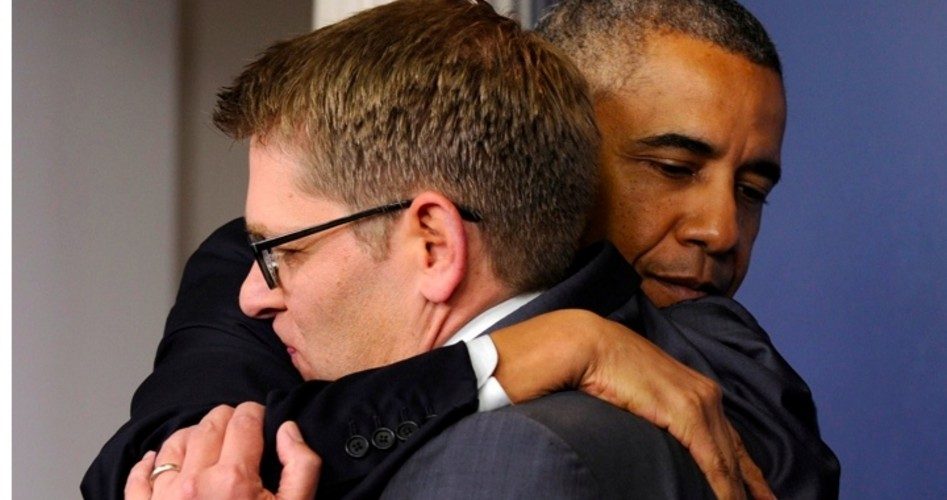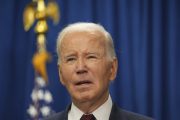
Friday afternoon’s announcement by the president that his press secretary, Jay Carney, was resigning in a couple of weeks caught some by surprise. Said the president:
One of Jay’s favorite lines is “I have no personnel announcements at this time.” But I do.
It’s bittersweet. It involves one of my closest friends here in Washington. In April, Jay came to me and said he was thinking about moving on and I was not thrilled to say the least. Jay has had to wrestle with this decision for quite some time….
I will continue to rely on him as a friend and an adviser after he leaves to spend as much of his summer as he can with his kids before he decides what’s next for him. Whatever it is, I know he’s going to be outstanding at it.
Carney dutifully responded, “It’s been a privilege. Every day. It’s been a privilege.”
It’s also been challenging. Since taking over from Robert Gibbs in February 2011, Carney has had to provide cover for the White House as scandal after scandal has erupted, ranging from the deadly Benghazi terror attack and IRS targeting of conservative groups to problems with ObamaCare — and most recently the VA scandal.
In his role as purveyor of messaging, shaper of public perception of those scandals, avoider of answering hard questions, and in general a shielder of the Obama administration from public outrage, Carney has had to appear transparent while actually covering up. After all, the present administration is supposed to be the most “transparent” in history. At least that’s what the president said following his inauguration:
My Administration is committed to creating an unprecedented level of openness in Government. We will work together to ensure the public trust and establish a system of transparency, public participation, and collaboration. Openness will strengthen our democracy [sic] and promote efficiency and effectiveness in Government.
Government should be transparent. Transparency promotes accountability and provides information for citizens about what their Government is doing. Information maintained by the Federal Government is a national asset. My Administration will take appropriate action, consistent with law and policy, to disclose information rapidly in forms that the public can readily find and use.
His transparency promise started to unravel almost immediately. But it wasn’t until May, 2013 that a survey of 60 White House correspondents done by Politico revealed that 25 of them (41 percent) thought that the Bush White House was more forthright than Obama’s, while just three of them thought the opposite. A plurality of those polled agreed with former New York Times’ executive director Jill Abramson’s statement that Obama ran “the most secretive White House” she had ever covered. Further, half of them said that they had been lied to at least once by a White House official, while 23 of them had actually been sworn at by a White House official.
Carney had to become a master of obfuscation in dealing with the press, appearing to answer their questions while avoiding giving hard and potentially embarrassing answers. In other words, he had to deflect and neutralize the question without appearing to do so. Time magazine reported a year ago that since his first press conference on February 16, 2011, Carney had said “I don’t know” — or some variation of it — more than 1,900 times.
In June 2013 an obsessive Yahoo News reporter explored Carney’s public utterances and responses in more detail and discovered that 1,383 times he referred a question to someone else. He refused to speculate on hypotheticals 525 times. When all the dithering, back-pedaling, waffling, whiffing, and stalling were counted, it came to 9,486 separate and distinct responses that avoided a direct, complete, or transparent answer.
Here are some of his most blatant Carneyisms:
“I don’t have the answer” (1905 times)
“I would refer you to someone else” (1383 times)
“You already know the answer” (1125 times)
“I’m not going to tell you” (939 times)
“Not that I know of” (927 times)
“I don’t want to” (588 times)
“I’m not sure” (549 times)
“I won’t speculate” (525 times)
“No comment” (429 times)
“That’s a good question” (381 times)
“See my response to that yesterday” (231 times)
“The president won’t tell me” (117 times)
And the best one of all:
“I’ll get back to you on that.” (387 times)
Carney will be replaced by Deputy Press Secretary Josh Earnest, who no doubt will have learned some of these tactics from the master. Whether Earnest will be able to outdo Carney in obscuring, stifling, suppressing, quashing, shading, smothering, or otherwise squelching the press corps’ questions remains to be seen. Carney set the bar of equivocation dizzyingly high.
Photo of President Barack Obama giving Jay Carney a hug after announcing that Carney will step down: AP Images
A graduate of Cornell University and a former investment advisor, Bob is a regular contributor to The New American magazine and blogs frequently at www.LightFromTheRight.com, primarily on economics and politics. He can be reached at [email protected].


